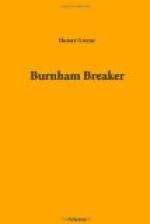He felt that it would be very sad indeed to die in this way, alone, in the dark, in the galleries of this old mine; it was not the way Robert Burnham’s son should have died. It was not that he minded death so much; he would not have greatly cared for that, if he could only have died in his mother’s arms, with the sweet sunlight and the fresh air and the perfume of flowers in the room. That, he thought, would have been beautiful, very beautiful indeed. But this, this was so different.
“It is very sad,” he said; “poor Ralph, poor boy.”
He was talking to himself. It seemed to him that he was some one else, some one who stood by trying to pity and console this child who was dying here alone in the awful darkness.
“It’s hard on you,” he said, “I know it’s hard on you, an’ you’ve just got to where life’d be worth a good deal to you too. You had your bitter an’ the sweet was just a-comin’; but never mind, my boy, never mind; your Uncle Billy says ’at heaven’s a great sight better place ‘an any you could ever find on earth. An’, then, you’re Robert Burnham’s son, you know, an’ that’s a good deal to think of; you’re—Robert Burnham’s—son.”
For a long time after this there was silence, and the boy did not move. Then fear came back to him. He thought that the darkness was closing in again upon him, that it pressed him from above, from right and left, that it crowded back his breath and crushed his body. He felt that he must escape from it.
He was too weak now to rise and walk, so he lifted himself to his hands and knees and began to move away like a creeping child.
There were many obstacles in his path, some of them imaginary, most of them real. There were old mine caps, piles of dirt, pieces of slate, and great lumps of coal on’ which he cut his hands and bruised his knees. But he met and passed them all. He was intent only on getting away from these dreadful powers of darkness, they tortured him so.
And he did get away from them. He came to a place where the space about him seemed large, where the floor was smooth, and the air so clear and pure that he could breathe it freely.
Utter darkness, indeed, surrounded him, but it was a darkness not peopled with evil beings; it was more like the sweet darkness of a summer night, with the fragrance of dew-wet flowers in the air.
He leaned against a pillar to rest. He thought to stay here until the end should come.
He was not suffering from any pain now; he was glad of that. And he should die peacefully, leaving no wrong behind him, with no guilt upon his conscience, no sin upon his soul. He was glad of that too. He wondered if they would know, when they found his body, that he was Robert Burnham’s son. Suppose they should never find it out. Suppose the days and months and years should pass away, and no one ever know what high honor came to him while yet he lived on earth. That would be sad, very, very sad; worse even than death itself. But there was a way for him to make it known. He thought that some sweet voice was telling him what to do.




